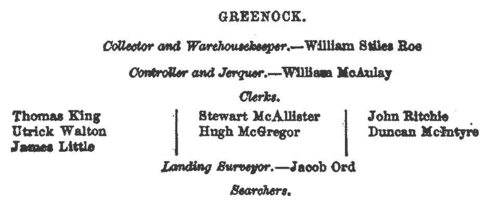Our indexes include entries for the spelling rourke. In the period you have requested, we have the following 164 records (displaying 21 to 30):
North Tipperary Jurors: Spring Assizes 1843
(1843)
'A List of the Names of all Persons qualified to serve as Jurors in the North Division of the County Tipperary, returned by the Collectors of Jury Cess to the Clerk of the Peace, submitted by him to the Magistrates at Special Session, Spring Assizes 1843.' | Sample scan, click to enlarge

|
Irish Insolvents
(1844)
Insolvency notices for Ireland: insolvency often caused people to restart their lives elsewhere, so these are an important source for lost links, especially for emigrants | Sample scan, click to enlarge

|
North Tipperary Jurors: Spring Assizes 1844
(1844)
'A List of the Names of all Persons qualified to serve as Jurors in the North Division of the County Tipperary, returned by the Collectors of Jury Cess to the Clerk of the Peace, submitted by him to the Magistrates at Special Session, Spring Assizes 1844.' | Sample scan, click to enlarge

|
Insolvents in Ireland
(1845)
Perry's Bankrupt and Insolvent Gazette, issued monthly, included lists of insolvencies and stages in the process whereby the insolvents petitioned for release from debtors' prison. The insolvent is generally referred to by name (surname first), address and trade. This is the index to the names of Irish insolvents, from the issues from January to December 1845. | Sample scan, click to enlarge

|
Boys in Millbank Prison
(1845-1846)
The new prison at Millbank was used as a holding centre for convicts destined for the hulks: 'few of the adult convicts remain for a longer period than three months; and of those who remain for a longer period, the most part are criminals of the worst description, who are awaiting embarkation for their final destination in Norfolk Island.'
The report of the commissioners appointed to inquire into the management of the prison includes a list of boys too small for removal to Parkhurst, giving: Register Number; Name; when and where convicted; Crime; Sentence; date received at Millbank. | Sample scan, click to enlarge

|
New South Wales Intestates
(1846)
The probate courts of the Australian colonies furnished returns of estates of deceased intestates, giving full name, colonial residence, supposed British or foreign residence of family (often unknown, or left blank), amount of the estate and how much had been disbursed and how. The date of death is often stated, and if by accident, suicide or crime. Names were carried forward from return to return until the estate was expended or exhausted. | Sample scan, click to enlarge

|
Traders and professionals in London
(1851)
The Post Office London Directory for 1851 includes this 'Commercial and Professional Directory', recording about 80,000 individuals. | Sample scan, click to enlarge

|
Customs Officers at Hull
(1853)
The lists of customs officers at the outports of Great Britain and Ireland give the full names of the staff arranged by rank - usually the collector, controller, clerks, landing surveyors, searchers, superintendent of lockers, chief tide surveyor and inspector of water guard, tide surveyors, inspectors of patrol, and inspecting commander of coast guard. | Sample scan, click to enlarge

|
New South Wales Intestates
(1853)
The probate courts of the Australian colonies furnished returns of estates of deceased intestates, giving full name, colonial residence, supposed British or foreign residence of family (often unknown, or left blank), amount of the estate and how much had been disbursed and how. The date of death is often stated, and if by accident, suicide or crime. Names were carried forward from return to return until the estate was expended or exhausted. | Sample scan, click to enlarge

|
Soldiers Missing after the Battle of Alma: 19th Regiment of Foot
(1854)
The commander of the British forces transmitted to the Secretary-at-War this return of casualties among non-commissioned officers and men sustained at and after the battle of Alma, 20 September 1854. This was the opening battle of the Crimean War, in which British forces seized the heights above the river Alma. The returns include those killed and wounded in the battle; missing; dead of wounds, and since dead, to 3 October 1854. | Sample scan, click to enlarge

|
Research your ancestry, family history, genealogy and one-name study by direct access to original records and archives indexed by surname.











